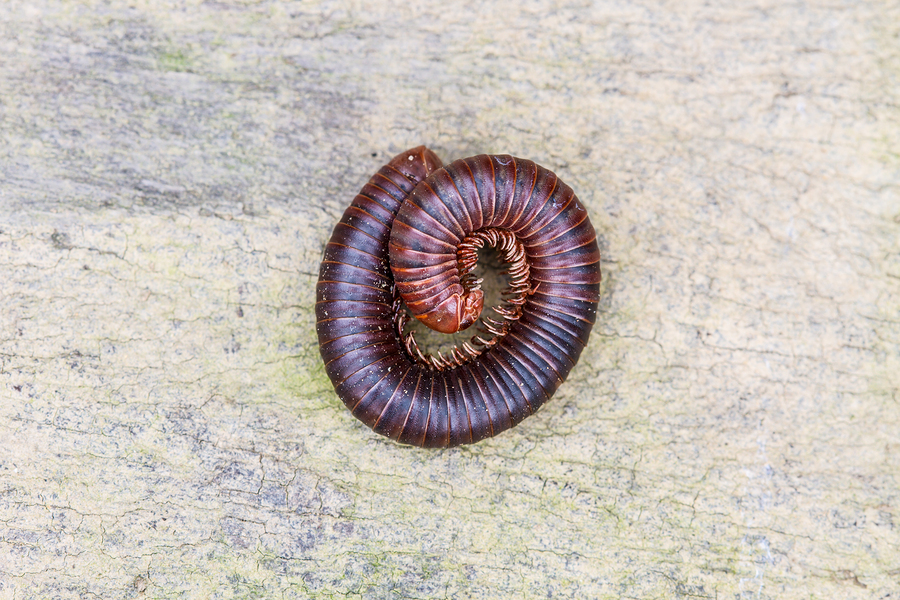READY TO GET STARTED?
REQUEST A FREE ESTIMATE
Fill out the form below or call (888) 466-7849 for a free, no-obligation estimate.

Did you know that a millipede isn’t an insect at all?! They are arthropods that feed on dead and decaying plant matter. Millipedes overwinter in homes which means they enter when the temperatures drop and come out when the temperatures rise. This is why you see millipedes around your home in warmer months…they’ve been there; they’ve just been “resting”. Well, they’re not always “resting”, sometimes they are mating which can be a pain because they can lay up to 300 eggs at a time. This is usually when you discover a millipede infestation. In the right situation, a millipede can live 5-7 years.
The best way to keep millipedes out of your house is to stop them from getting in.
If you have a millipede infestation, contact your local pest control company for a free pest inspection.
Summer vacation is almost over and before we know it schools and universities will be back in session. While shopping for school supplies and a new wardrobe might take precedence over bed bug prevention, Northwest Exterminating, a pest control management company, encourages parents and students to also spend some time brushing up on bed bug prevention tips.
Bed bugs are excellent hitchhikers and thrive in heavily populated places. This makes classrooms and dorms the perfect settings for bed bugs to take up residence.
A study conducted by the National Pest Management Association (NPMA) and the University of Kentucky found that bed bug infestations are on the rise in many different types of dwellings, including school and college settings. According to the survey, 47 percent of respondents had treated for bed bugs in college dorms in 2013, while 41 percent had reported bed bug infestations in schools and daycare centers.
NPMA also advises college students to take steps to protect against bed bugs, including:
For more information on bed bugs, please visit our Bed Bug Control page.
As people venture outside to enjoy the sunshine and warmer weather we want to encourage increased public awareness of ticks and their numerous health risks.
Certain species of ticks are capable of transmitting serious diseases to humans when they bite, including Lyme disease, babesiosis and Rocky Mountain spotted fever. We encourage people to take steps to protect themselves and their pets from tick bites when outdoors this summer and decrease the chances of contracting one of these tick-borne illnesses.
Below are some tips from the National Pest Management Association (NPMA), a nonprofit organization committed to the protection of public health, food and property from household pests.
For more information on ticks, please visit https://www.callnorthwest.com/learning-center/identify-your-pest/ticks/.
Source: NPMA
The South (and a greater portion of the country) is making its way out of a treacherous winter. During the recent cold months its likely that pests or wildlife may have taken shelter in your home. Since Spring is approaching it’s a good time to get in the habit of checking around your property for areas that could have been used or could be used as entry points for wildlife.
Wildlife and pests come in all different shapes and sizes. Some are relatively harmless while others can cause potential health threats. Illnesses can be contracted by breathing in contaminated air with spores that develop from fungus grown in animals’ fecal matter. The elderly, children, or those with compromised immune systems can be at high risk for contracting these illnesses.
If you hear scratching or scurrying in your walls, don’t ignore it or try to solve the problem on your own, call a professional wildlife removal team. Guessing or attempting to get rid of the animal on your own could result in costly damage and even danger. When hiring a trusted wildlife removal company, like Northwest Exterminating, the first order of business is to inspect the property and assess the situation. They can identify the issue based on where you’re hearing noises, openings, droppings, gnaw marks, or nests. Once the pest is identified a customized plan can be established.
As we say here over and over again, the key is PREVENTION. Some wildlife are bound and determined to get into your home regardless of the steps you take, however, there are ways you can deter them.
Wildlife Prevention Tips:
Bugs are no different than humans in that we’re all in search of 3 basic needs: water, food, and shelter. It’s important when trying to obtain a pest-free home that we are eliminating pest’s basic needs. Limiting their access to these items will be a big step in prevention AND maintenance.
So what steps do you take to eliminate these sources?
How to Eliminate Pest’s Water Sources From Your Home:
How to Eliminate Pest’s Food Sources From Your Home:
How to Eliminate Pest’s Access to Shelter From Your Home:
If pests have already found their way into your home it’s best to call a professional exterminator. A pest professional can properly inspect your property, identify the pest, identify the sources, effectively treat the home for the targeted pest, and work with you to develop a customized action plan to maintain and prevent further issues from occurring. If you’re in need of a professional pest control company call Northwest Exterminating!